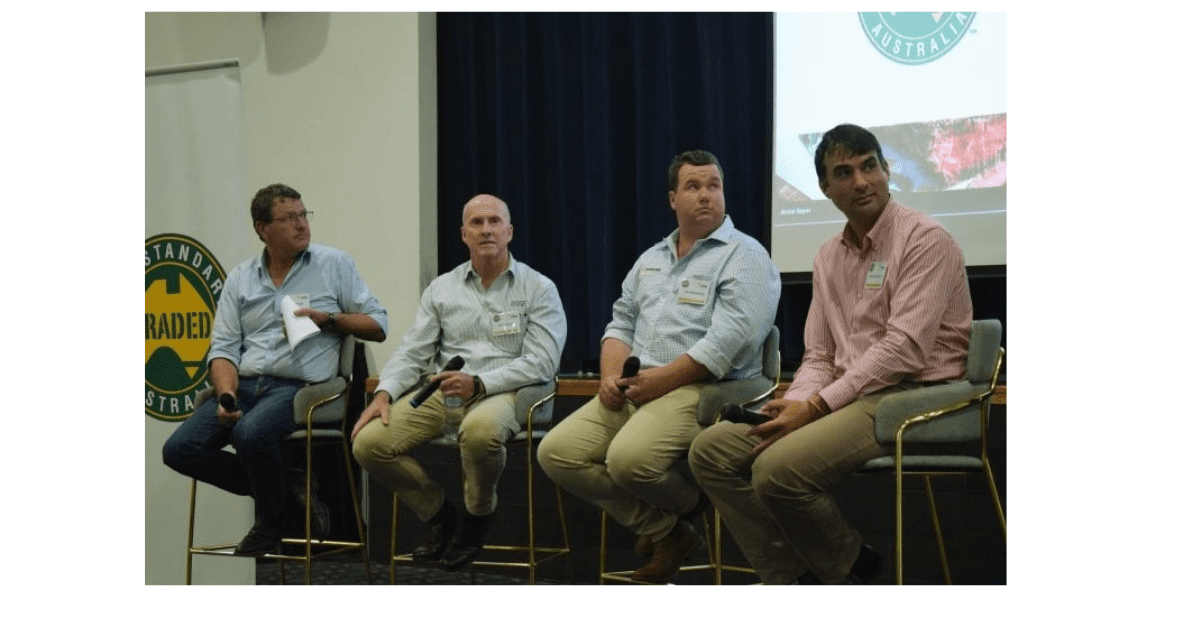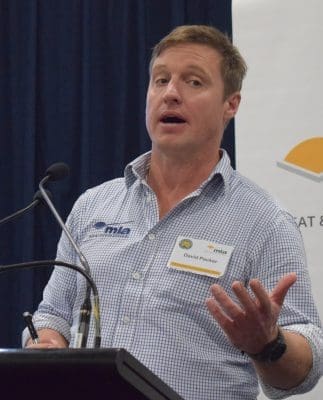
Producer Bill Mitchell, Casino Food Co-op’s David Carew, Bindaree’s Zac McInerney and the University of New England’s Peter McGilchrest all took part in a discussion session at the MSA awards in Armidale.
AS CARBON neutrality and sustainability commitments engulf the world of politics and corporations, two east coast processors have warned the movement is quickly coming for the beef industry.
The subject was brought up at the Meat Standards Australia (MSA) awards in the New South Wales city of Armidale yesterday, where representatives from Bindaree Beef and the Casino Food Co-op said their customers were crying out for carbon neutral.
Similar comments were made at the end of last year by well-known scientist Richard Eckard, who was urging producers to think long and hard before cashing in carbon credits. Victorian supply-chain, Hopkins River Beef, has also made moves to prepare for domestic market demands to become carbon neutral.
Casino Food Co-Op business development manager David Carew said in the export market calls for sustainability benchmarks like carbon neutral were loud and clear.
“On every mission statement in every hotel in Asia it says that they need to become sustainable,” Mr Carew said.
“We’re making great progress in the sustainability space and we need the producers to get behind us – because this is our way of creating the next benchmark of ‘clean and green’.”
Mr Carew said labelling needed to keep up with the advances in sustainability – and had the potential to limit market access.
“I don’t know why we don’t have a formalised carbon footprint or sustainability certification system. The seafood industry already has a sustainability certification and that is for something that is underwater and we can’t even see it,” he said.
“We haven’t started the process of communicating the advances we have made in carbon and sustainability and food service chains around the world need to tick the ‘sustainability’ box.
“The value in that type of labelling might be difference in us displacing Indian ox or Brazilian meat in some of those lower volume markets – we really need those markets.”
A matter of “when not if”
Similar pressure was being felt by Northern NSW processor Bindaree Beef, who sell several brands in domestic and export markets. Planning and analytics manager Zac McInerney said sustainability demands were coming for the Australian industry.

MSA program manager David Packer
“The fact is it is coming to our industry, it’s a matter of ‘when not if’,” Mr McInerney said.
“Sustainability and carbon neutrality is very high on the radar of the processing industry and we are trying to ensure we are in front of that.
“We are seeing early signs of it in the processing sector with recyclables and supermakets trying to reduce plastics, we’re also seeing products going into a reusable crate rather than a box.”
Changing role of MSA
While sustainability and carbon neutrality was one of the talking points, the role of the Meat Standards was also discussed.
MSA program manager David Packer said over the past 10 years the program had changed its strategy, with almost 200 beef brands using it to verify their product.
“When MSA was first established, there was a heavy focus on consumer education and talking about the trademark,” Mr Packer said.
“These days it is more about underpinning the brands and letting the brand owner do the marketing of their product. MSA is more about ensuring the consistency of the meat quality and brands can do the educating.”
- This conversation was part of the MSA awards in Armidale. The awards are currently travelling to each state announcing the top MSA producers. See more in today’s alert about the NSW award. Queensland winners are expected to be announced in Roma tomorrow

When thinking about certification systems within the carbon and natural capital frameworks/themes; it is taking time due to carbon and biodiversity being treated separately. This causes disparate outcomes for each theme of agri-ecosystem management. As Natural Capital (in its totality) evolves and integrates into aligned land management deliverables, it will be easier to create certification/verification. It would be good to be doing this already, but the lagging sentiment at all levels about carbon and natural capital sees Australia now having to catch up with consumer sentiment and regulatory demands. There are many good people working on making this happen, by organisations such as the Australian Farm Institute and private stakeholders….just needs positive intent by agriculture at large and bipartisan support by governments. Easier said then done has been my experience!!!
“I don’t know why we don’t have a formalised carbon footprint or sustainability certification system. The seafood industry already has a sustainability certification and that is for something that is underwater and we can’t even see it,” he said.
Considering that we are touching somewhere near 90% imported seafood in Australia, none of which is certified, how well has that gone for fishers?
Currently, most livestock producers’ carbon credits in Northern Australia have been hijacked by government. Proceed with caution.
Keep the environmental groups out of the space. They cause havoc wherever they go, and the major environmental certification group has huge reputational damage.
Mr Carew wonders why we do not have a sustainability certification system even though markets are wanting such assurance.
It is a good question.
The answer is not because such systems are difficult to design or that they are too expensive.
Rather it is because producer organisations hide behind the mantra of all farmers being conservationists.
It is because each industry ,whether it be beef or cotton or sugar wants to do its own thing (or nothing at all) irrespective of most product being produced on multi-industry farms.
It is because, responding to industry pressure, governments, both State and Federal, have wasted millions of taxpayer dollars on schemes (they aren’t systems) that were not fit-for-purpose.
And it is because we persist with reductionist thinking leading to systems for carbon or biodiversity or whatever.
We have delayed for over two decades. We have failed to support innovative producers. We have wasted millions off dollars.
As for MSA and many other innovative systems we just need effective broadly based leadership and commitment that reflects community beliefs and values.
It is not too much to expect.